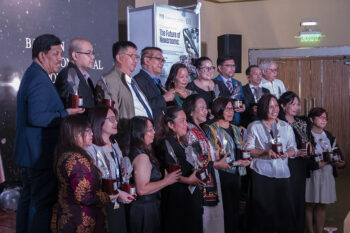CAGAYAN DE ORO CITY (MindaNews/30 Nov.) — Contemplating conditions in our barangays, with their generally shabby, disorderly appearance, one would think there’s a dearth of cultured people in them, people who care about order, grooming, or neatness in their surroundings.
Cultured people are civilized people, people who view their dwellings or residential compounds as as much a reflection of their personality or way of life as their attire or style of dressing. Concern for quality of life is a mark of civilized people.
Sloppy, garbage-strewn surroundings are not compatible with a citizen’s pride of place or a caring sense of community. Slums diminish a community’s dignity, giving it an air of disrepute.
Indifference among Professionals
It is surprising therefore that citizens known for their high education or upbringing—including educators and professionals—ignore or tolerate slums and rundown structures in the community or neighborhood.
Disorder and neglect in barangays also betray the incompetence or low education of local officials. Putrid remains of collected garbage by the wayside, overgrown grass, filthy canals, and rundown structures all indicate official unconcern or incompetence. That there is general lack of pleasing design, style, or elegance is bad enough. But even sanitation is neglected.
The nice and decent-looking neighborhoods are found only in exclusive portions of the community—in subdivisions separated from the larger territory of the barangay by walls and guarded gates. It’s as if the people in them don’t want to be identified with the rest of the community, as if they’re ashamed to acknowledge their fellow citizens, let alone share the same facilities or living space with them
Unflattering
This phenomenon projects an unflattering portrait of our society. Because the larger portion of the jurisdiction—the public domain, the portion administered by elected officials—have the look of neglect and are untidy, officialdom are shown to be neglectful, untidy, and careless. That’s the practical effect of leaving run-down surroundings or squalid structures unattended.
We all know that most barangays aren’t rich. But being poor is not an excuse for tolerating disorder and filth. Being poor does not mean being uncivilized. Poverty cannot be an excuse for living without dignity or sense of propriety.
Besides, barangays aren’t really poor anymore, not since ample funds from the Internal Revenue Allotment (IRA) and other sources have been allocated to them. There is no excuse for a barangay hall today to be shabby, its facilities substandard, its amenities primitive.
Unfit for Public Service
Barangay officials who leave their facilities and compounds in such pitiful condition do not deserve to be in office. The least they can do with what they have is display “good house-keeping” sense. They should not project disorder to the masses. If they cannot be models of civilized living, they’re unfit for public service.
At the very least, public service requires maintaining high standards of sanitation and healthy surroundings for the entire community. This is our basic community, the primary level of our republic. To tolerate squalor in it should cause the constituents to recall the officials, to remove them for loss of confidence.
Squalor and the filth that characterize it expose children and adults to disease. Squalor and filth renders eateries and public facilities like parks and sidewalks unfit to accommodate people.
Leading Citizens Must Lead
Who would know better, enough to call attention to what ought to be done, than the A and B class of citizens, the middle and upper strata of the community? It is they that must call the officials’ attention. It’s the least they can do to demonstrate pride of place or sense of community, the kind that looks out for the common good.
Failing to do so is tantamount to saying: never mind if the barangay is filthy, disorderly, or shabby as long my own compound or household is orderly and elegant. It is selfish.
It is bad enough that when the same well-off citizens have a meeting, they hold it in restaurants or exclusive places elsewhere, usually in the poblacion. Rarely if ever are they seen in their own barangay’s compound, and even more rarely do they attend community undertakings.
As for the poor, they can only make do with the barangay compound’s primitive facilities.
Rarely if ever are the affluent and the poor seated in the same gathering. Hardly do they exchange views or do anything together—things that conscientious citizens of a democracy do in a participative process.
As a result, since the planning of community projects takes place in the barangay hall and are managed from its premises, only the financially-wanting and technology-deprived poor get to participate in such governing activities. The affluent don’t get to input their ideas. They cannot lend their expertise or share their standards for planning or implementing programs and projects.
Thus, invisible and uninvolved, affluent and better-educated citizens have no impact on local development or governance. Worse, they have little or no influence upon the values, attitudes, work ethic, or outlook of the masses, their neighbors. Then they wonder why the masses don’t vote with them st election time.
In a democracy, a republic, leading citizens usually set the norms for public behavior and the terms for political engagement. It is a responsibility that weighs heavily upon those who know more, have more, and can give more. And it is how they get to influence the community.
In other words, leading citizens lead, and do so by example. Why else would they be called leading citizens? (MindaViews is the opinion section of MindaNews. Manny Valdehuesa writes from Cagayan de Oro and is the president and national convenor of Gising Barangay Movement Inc. He can be reached at valdehuesa@gmail.com.)







